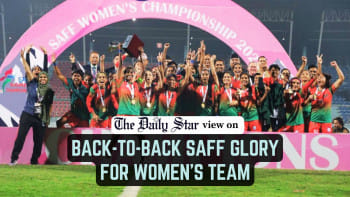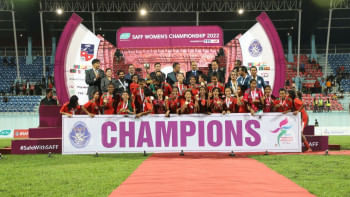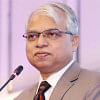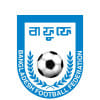Winning the second SAFF Women's Championship: Footsteps to the future

Till the 80th minute, the scores were tied at a goal each. Both Bangladesh and Nepal fought brilliantly till that point; however, after Nepal equalised, they began to pose more of a threat in the attacking third. Two attacks from Sabitra Bhandari exposed Bangladesh's deteriorating physicality, but somehow they held on. Then, a quick throw-in changed everything.
Ritu Porna Chakma received the ball well on the far left, quickly manoeuvring past the Nepali defender before lopping it over three players and the keeper. When the shot left her foot, it felt like time had stopped. It sailed past Anjila Subba and beyond her reach, hitting the back of the net. The entire stadium fell silent, except for the dugout of the visiting team. There it was, the winning goal, and it was a spectacular one.
Bangladesh came into the SAFF Women's Championship as the defending champions. After drawing with Pakistan, they convincingly defeated India, SAFF's powerhouse, with a scoreline of 3-1. In the semifinals, Tohura Khatun's hattrick and Sabina Khatun's brace secured a resounding 7-1 win, setting up a rematch of the previous edition's final against host Nepal.
Aside from India, no other team has won the competition, let alone twice. This victory comes at a critical time as Bangladesh undergoes a political and systemic reform. With a young leader, Asif Mahmud, at the forefront as the youth and sports adviser on the interim government, every major win strengthens the case for giving female athletes the respect and budget they deserve in order to progress their development.
Either way, our women's team really don't need more proof of their worth. Year after year, they have shown resilience and talent. But this is no perfectly oiled machine. There are many discrepancies, shortfalls, and missed opportunities to capitalise on growth. These stem from the Bangladesh Football Federation's failure to function effectively due to systemic corruption.
In 2022, when the women's team became champions for the first time, they were promised improvements and fair resource allocation. But those promises were broken, and the resources never arrived. When the team had a chance to play in the Olympic qualifiers, Abu Nayeem Shohag, the former general secretary of BFF, claimed there was not enough budget for their travels to Myanmar. It was disheartening that in a country with so few sporting achievements, we were willing to forgo the hard work of these women due to mismanaged funds. Worse still, in 2023, FIFA banned Abu Nayeem Shohag and others for illegal conduct, failing to fulfil their duties, and falsifying accounts. The question remains: did these officials feel no shame when they denied the women's team the opportunity due to the federation's own dishonesty? Is our women's team really so low in priority that they received no respect or empathy for their hard work?
There is no denying that our current crop of players is generational in South Asia, and with a little support, they have limitless potential. The general mindset on women's football has evolved in the region as well. In contrast to 20 years ago, when some people, on the grounds of religion, protested against the women's team playing against a team from West Bengal, there is now a genuine appreciation and pride.

Another reason this final was important is because it demonstrated the collective power of a united country. Several players come from Indigenous backgrounds, and it is vital to remember that the minority communities contribute immensely to the country. That's perhaps why Ritu's celebration felt appropriate. Her "shush" to the crowd could easily be interpreted as a response to those who fail to see their value. Without them, this final might have easily gone Nepal's way. This championship gives us a chance to start anew and improve all aspects of women's sports, ensuring that no community gets left behind.
But how do we progress? What is the next step to ensure that we don't fall into the same broken path again? First, we need to pay these players the unpaid salary they are owed. Yes, Bangladesh can boast of being a pioneer in women's sports with the highest player wages in South Asia, but if they are not paid, what is that really worth? Fortunately, the government has said steps are being taken to clear the dues. Second, we need to rethink the system of awarding large lump sums only when players win major tournaments. Bonuses are fine and justified, but a steady, systematic funding process is essential. This would allow growth in the game, better infrastructure, and improved academies to create a sustainable path to professional development. Most importantly, we need experienced coaches in the subdivisions of the sport, who can develop the different areas of a team. Organising more international friendlies is equally essential. We have barely played any international matches since 2022, and this lack of exposure shows when we face teams beyond South Asia.
There is much to be done if we want to elevate our women's team to the next stage. Systemic changes in BFF's fund management, resource allocation, and transparency are essential for developing our sporting department. Far too many talented youth have abandoned their dreams, and too many players are tired of being failed by the system. Unless we follow through on our promises, progress will remain elusive. Our women's team has never deserved to be a footnote; it's time we gave them a permanent place in the headlines.
And to the Bangladesh women's team and staff members: thank you for making us dream again.
Raiyan Binte Rafiq is a sports columnist for The Daily Star. She is currently pursuing an LLM, while freelancing for INDIVISA. She also oversees recruitment at Next Level Sports Management based in Bangladesh.
Views expressed in this article are the author's own.
Follow The Daily Star Opinion on Facebook for the latest opinions, commentaries and analyses by experts and professionals. To contribute your article or letter to The Daily Star Opinion, see our guidelines for submission.

 For all latest news, follow The Daily Star's Google News channel.
For all latest news, follow The Daily Star's Google News channel. 











Comments